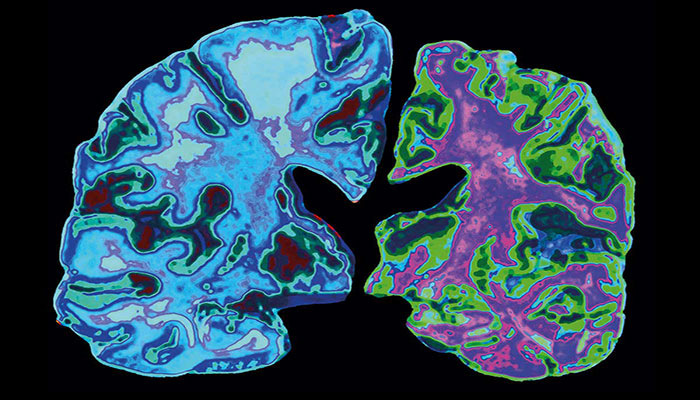Experts stress need for early diagnosis of Alzheimer’s disease
Although there is no certain way to prevent Alzheimer’s disease but resorting to regular physical exercise for at least 150 minutes a week, consuming balanced diet and staying mentally and socially active reduce the risk of the neurodegenerative disease, neurologists and psychiatrists said on Sunday.
They were speaking at an awareness session, titled ‘Know Dementia – Know Alzheimer’s’, organised by the Pakistan Society of Neurology (PSN) at a hotel in connection with World Alzheimer’s Day that will fall on September 22. The event was addressed by eminent physician Prof Dr Ejaz Vohra, neurologist Prof Dr Muhammad Wasey, psychiatrist Prof Dr Iqbal Afridi, Prof Dr Arif Herekar and Dr Abdul Malik.
The speakers maintained that smoking, frequent consumption of alcohol, sedentary lifestyle, untreated depression, social isolation and uncontrolled diabetes and hypertension could lead to Alzheimer’s disease, and called for creating awareness among the common people, physicians and other segments of society for the early diagnosis of the disease so that its progression could be slowed with the help of medicines and other interventions.
Prof Wasey said Alzheimer’s was a neurodegenerative disease and most common type of dementia. “It is a progressive disease beginning with mild memory loss and possibly leading to loss of the ability to carry on a conversation and respond to the environment. “Alzheimer's disease involves parts of the brain that control thought, memory and language,” he added.
The expert, however, maintained that there was unfortunately no cure available for Alzheimer’s and the available drugs did not reverse the disease but only slowed down the progression of the disease.
“In Pakistan, most of the patients of Alzheimer’s disease when diagnosed, are in the phase of moderate to severe disease due to late diagnosis,” he said. Briefing on some FDA-approved drugs available for treatment and 3 management of Alzheimer’s disease in Pakistan, he said monoclonal antibodies and stem cells therapy were still in an experimental phase and urged the government to fund the clinical trials of the new drugs and therapies so that new medicines and interventions could be discovered for the treatment of chronic illnesses.
Prof Vohra said that like elsewhere in the world, aging population was increasing in Pakistan, where the number of people above 60 years of age would reach 40 million by 2050. He added that the incidence of Alzheimer’s disease was likely to increase also in society as it was a disease of elderly people.
Urging the authorities to spend on public health and primary healthcare, he stated that countries like Pakistan lacked resources to effectively treat millions of patients every year so the best option was to work for the prevention and awareness about the diseases.
He maintained that there should be non-governmental organisations and societies that should be working for the well-being of elderly people in Pakistan where they were getting socially isolated. He also called for training of caregivers to take care of people with Alzheimer’s disease and dementia.
Advising the people to make plans for their lives after retirement, Prof Afridi said that instead of considering themselves ‘retired’ and of no use, the elderly people should continue working to stay mentally and physically healthy. He asked the aged people to continue to exercise, walk and adopt a healthy lifestyle.
“In order to boost and retain memory, people should continue learning something new and getting education. People should get proper sleep, they should eat healthy and balanced food, train their brain by challenging it, walk and talk with old and new friends and meditate,” he advised.
-
 Will There Be 'Smiling Friends' Season 4? Animated Series' Creators Make Big Announcement
Will There Be 'Smiling Friends' Season 4? Animated Series' Creators Make Big Announcement -
 Jennifer Aniston, Boyfriend Jim Curtis Prepare To Move In After 'hard Launching' Their Relationship?
Jennifer Aniston, Boyfriend Jim Curtis Prepare To Move In After 'hard Launching' Their Relationship? -
 Lamar Odom Details Struggle With Addiction And ‘amazing’ Rehab Experience
Lamar Odom Details Struggle With Addiction And ‘amazing’ Rehab Experience -
 Nvidia Vs Intel: Jensen Huang Braces Investors For Renewed Battle As Chip Wars Reignite
Nvidia Vs Intel: Jensen Huang Braces Investors For Renewed Battle As Chip Wars Reignite -
 Heidi Montag Reveals Why She Felt 'robbed' On 'The Masked Singer' After Her Elimination
Heidi Montag Reveals Why She Felt 'robbed' On 'The Masked Singer' After Her Elimination -
 Australia’s Former PM Gives His Honest Take Against The British Monarchy: ‘It Remains This Anachronism’
Australia’s Former PM Gives His Honest Take Against The British Monarchy: ‘It Remains This Anachronism’ -
 Bombshell Reason Behind Cardi B, Stefon Diggs' Breakup Revealed
Bombshell Reason Behind Cardi B, Stefon Diggs' Breakup Revealed -
 Hilary Duff Details How She Protected Her Children’s Mental Health Amid Divorce
Hilary Duff Details How She Protected Her Children’s Mental Health Amid Divorce -
 'The Masked Singer's Snow Cone's Identity Revealed
'The Masked Singer's Snow Cone's Identity Revealed -
 Kash Patel Fires FBI Officials Behind Trump Mar-a-Lago Documents Probe, Reports Say
Kash Patel Fires FBI Officials Behind Trump Mar-a-Lago Documents Probe, Reports Say -
 Martin Short's Daughter Katherine's Death Takes Shocking Turn As Terrific Details Emerge
Martin Short's Daughter Katherine's Death Takes Shocking Turn As Terrific Details Emerge -
 Jeff Galloway, Olympian, Author, Running Legend, Dead At 80
Jeff Galloway, Olympian, Author, Running Legend, Dead At 80 -
 Patrick Dempsey Reacts To Tragic Death Of His 'Grey's Anatomy' Co-star Eric Dane
Patrick Dempsey Reacts To Tragic Death Of His 'Grey's Anatomy' Co-star Eric Dane -
 Sidney Crosby Injury News Shakes Penguins After Olympic Tournament
Sidney Crosby Injury News Shakes Penguins After Olympic Tournament -
 Yankees Honour CC Sabathia With No. 52 Retirement This September
Yankees Honour CC Sabathia With No. 52 Retirement This September -
 Cuban Government Says Boat Full Of Armed Men Fired On Border Guards, Killing 4
Cuban Government Says Boat Full Of Armed Men Fired On Border Guards, Killing 4




